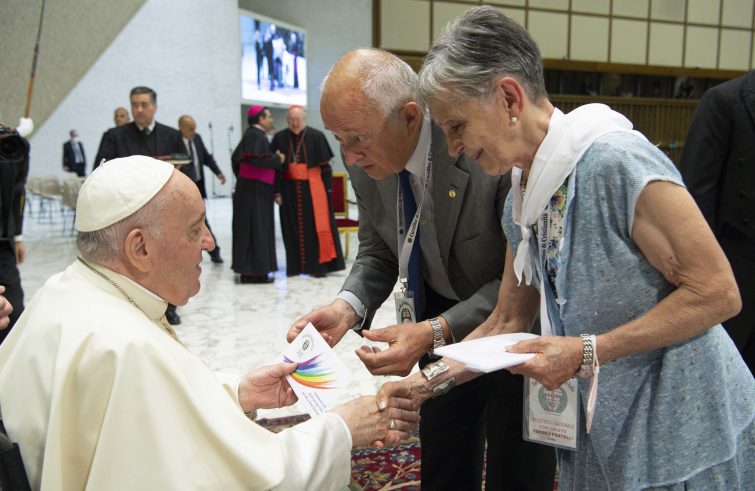
“Wrinkles are a sign of experience, a sign of life, a sign of maturity, a sign of having made a journey.” In his catechesis at today’s General Audience Pope Francis quoted the words of Anna Magnani, a renowned Italian actress, when she had been told that she had to remove her wrinkles. “Do not touch them to become young, that your face might look young”, the Pope said in unscripted remarks: “What matters is the entire personality; it’s the heart that matters, and the heart remains with the youth of good wine – the more it ages the better it is.” The finger is pointed at a prevailing ‘myth’ of our time and culture: that of eternal youth, the “desperate obsession with an incorruptible body.” Old age is not appreciated today – the Pope explained during the general audience in Saint Peter’s Square – “Because it bears the undeniable evidence of the end of this myth, that makes us want to return to our mother’s womb always to return with a young body.” “Technology is fascinated by this myth in every way. While awaiting the defeat of death, we can keep the body alive with medicine and cosmetics which slow down, hide, erase old age”, Francis said. His Holiness pointed out that “well-being is one thing, the myth that feeds it is another. The confusion between the two is creating a certain mental confusion in us”, Francis cautioned the faithful: “To confuse well-being with feeding the myth of eternal youth. Everything is done to always have this youth – so much make-up, so many surgical interventions to appear young.” “The words of a wise Italian actress, [Anna] Magnani, come to mind – the Pope continued off text – when they told her she had to remove her wrinkles and she said, ‘No, don’t touch them! It took so many years to have them – don’t touch them!’”
Being old is not only not an obstacle to the being born from above that Jesus speaks of, but it becomes the opportune time to illuminate it, disassociating it from being equated with lost hope”,
Francis said commenting on Jesus’ words in the encounter with Nicodemus: to “see the kingdom of God”, one needs “to be born again from above.” “This does not mean starting over from birth, of repeating our coming into the world, hoping that a new reincarnation will open up the chance of having a better life”, the Pope pointed out. “Repeating that makes no sense. It would, rather, empty all meaning out of the life we have lived, erasing it as if it were a failed experiment, a value that has expired, a wasted void. No, that’s not what this is. This life is precious in God’s eyes – it identifies us as beings who are loved tenderly by God.” This “birth from above” that allows us to “enter” the kingdom of God, “is a generation in the Spirit, a passage through the waters toward the promised land of a creation reconciled with the love of God.”: “It is a rebirth from above with the grace of God. It is not being reborn physically another time.”
“Life in our mortal flesh is too small a space and time to keep it intact and to bring to fulfilment in the world’s time the most precious part of our existence”,
Francis explained. In this perspective, “old age has a unique beauty – we are journeying toward the Eternal. No one can re-enter their mother’s womb, not even using its technological and consumeristic substitute. This is not wisdom; this is not a journey that has been accomplished; this is artificial. That would be sad, even if it were possible. The elderly person moves ahead; the elderly person journeys toward the final destination, towards God’s heaven; the elderly person journeys with the wisdom of lived experience.”
“Old age, therefore, is a special time of disassociating the future from the technocratic illusion of a biological and robotic survival, especially because it opens one to the tenderness of the creative and generative womb of God”,
the Pope said. In the concluding part of his catechesis Francis specifically highlighted the tenderness of the elderly: “Watch how a grandfather or a grandmother look at their grandchildren, how they embrace their grandchildren – that tenderness, free of any human distress, that has conquered the trials of life and is able to give love freely, the loving nearness of one person to others. This tenderness opens the door toward understanding God’s tenderness. God is closeness, compassion and tenderness.
This is what God is like, he knows how to embrace. And old age helps us understand this aspect of God who is tenderness.”
“When we think of old age like this, we can say – why has this throw-away culture decided to throw out the elderly, considering them useless?” – Francis asked. “The elderly are the messengers of the future, the elderly are the messengers of tenderness, the elderly are the messengers of the wisdom of lived experience. Let us move forward and watch the elderly!”.










